Women, Peace, and Security: Reframing Our Region’s Future Part 2
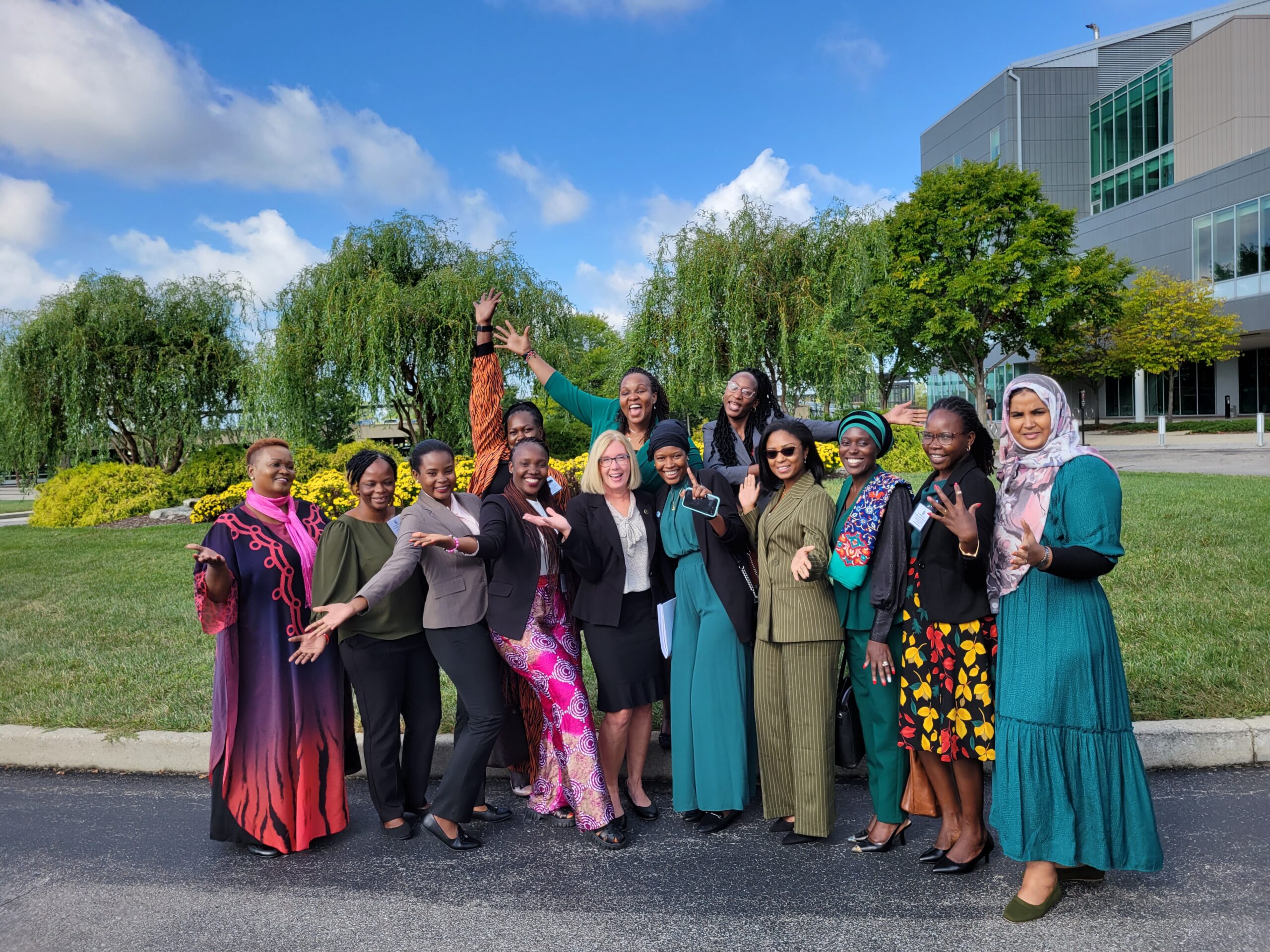
In our last post, we looked at the Women, Peace, and Security (WPS) policy framework that recognizes that women must be critical actors in all efforts to achieve sustainable international peace and security. WPS promotes a gendered perspective and women’s equal and meaningful participation in peace processes, peace-building, and security.
During the week of October 4th-10th , our international delegates met with Representative Cindy Abrams and the nonprofit organization, Women Helping Women. Representative Cindy Abrams and the women who run Women Helping Women are prime examples of female leadership in the Southwest Ohio and Northern Kentucky region.
Ohio Representative Cindy Abrams
Representative Cindy Abrams is a Republican politician in the Ohio House of Representatives, representing the 29th district. This district consists of portions of Southwestern Hamilton County. She currently in her 4th year of serving within the Ohio House of Representatives and is the Assistant Majority Representative. She also serves as the Criminal Justice Chair.
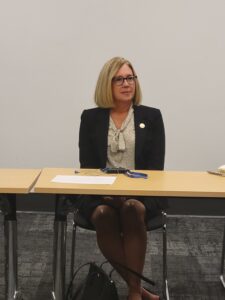
Representative Cindy Abrams
She has faced obstacles on her journey. Representative Abrams told our delegates that men told her she would never succeed in police because she was too small and nice. This meant she had to work even harder to be accepted and respected. She was clear that women are smart and have a different life experiences. Women bring different skills, different ideas, and different solutions to the table. This means that women have a different way of handling tough situations.
Over the last four years, Representative Abrams has had four strong female aids. Every single young woman who has served under her has told her that she mentored and supported them to gain confidence and go on to better things.
Representative Abrams has led two initiatives to mentor young women.
The first is SHELeads. SHELeads’ mission is to identify, inspire and mentor Republican women for public office. This leadership program provides education for women wanting to run for office. This program helps women learn how to run, support women’s fundraising, and teaches them how to be successful.
The second is the Harrison Junior City Council. Under Cindy Abrams leadership, the Harrison City Council created the Junior City Council Pilot Program to enhance the leadership abilities of students and allow them to see local government work firsthand. Junior City Council members represent their peers by providing invaluable insight regarding topics like public safety, recreation, parks, entertainment, traffic, festivals, trails, environmental stewardship, and other social issues. Students will learn leadership skills, improve their chances for scholarships, learn how City government operates, and how they can influence government activities to make a positive difference in the community.
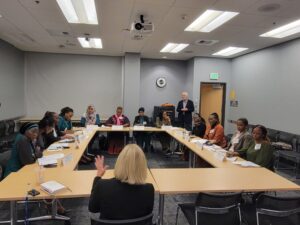
Representative Cindy Abrams speaking with Delegates
The Harrison Junior City Council was created when a girl wanted to learn more about the City Council. Representative Abrams invited her to join meetings. She brought a friend. They were so excited that they invited eight of their friends to join them, for a total of ten. They met twice a week for eight weeks, visiting every department in the city to learn how government work. This program has now expanded to include 15 students in grades 7 and 8. There is so much interest in this program that they, unfortunately, must turn away students.
Our delegates were so impressed with these leadership opportunities that many of them wanted to work with Representative Cindy Abrams to recreate these types of programs in their countries. They face many barriers in their home countries, some of which include limited access to education, illiteracy, unfair economic burdens, and lack of leadership positions for women. The delegates want to create opportunities for girls to learn leadership skills and learn how to become leaders in their communities by experiencing programs like SHELeads and a Junior City Council.
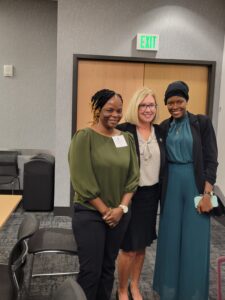
Women Helping Women
Women Helping Women is a nonprofit that was founded in 1973, Women Helping Women (WHW) prevents gender-based violence and empowers all survivors. WHW provides evidence-based prevention and expert crisis intervention and support services for survivors of dating violence, sexual violence, domestic violence and stalking in Hamilton and Butler, Ohio Counties (including sexual violence crisis services to Brown and Adams Counties). WHW operates from a public health framework that is survivor centric and promotes diversity and inclusion as core operating values. WHW meets the needs of our region and serves over 7,000 clients annually.
Women Helping Women offers support services to help plan safety, answer legal questions, connect with services like housing, and advocate as their clients recover from dating violence, domestic violence, sexual assault, and stalking. Expertly trained advocates answer Hotline Calls 24 hours a day, seven days a week, 365 days a year to provide critical crisis intervention to dating violence, domestic violence, sexual assault, and stalking survivors as well as to family members and friends. Advocates also provide referrals to appropriate community services.
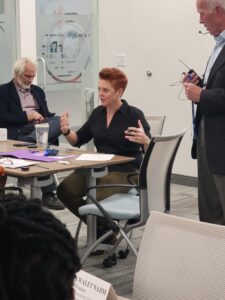
Women Helping Women’s President, Kristin Shrimplin, speaking to delegates
Their mission is to meet survivors where they are. The goal, according to President Kristin Shrimplin, is to make survivors aware of resources and how they can access them. The goal is not to put the burden on survivors to find help—they are already doing enough. They help create family-focused safety plans so that families do not have to be broken up. Kristin Shrimplin said that most of the time survivors just want to talk.
Some of their most important work is going into schools. Women Helping Women advocates work with students in grades 7-12 to prevent domestic violence and empower students to get help if they see warning signs. They offer 10-day or 5-day programs in schools or other youth serving organizations. The Prevent and Empower curriculum explores signs of healthy and unhealthy relationships, sexual assault and sexual harassment (including use of social media and technology), consent, bystander intervention, resources to help a friend or loved one and communication skills geared to promote a healthy relationship. As representatives said, “healthy relationships begin early.”
Delegates were so interested in learning more about these programs and how they could bring them to their own countries. They spoke about funding so that they could begin implementing programs like these in their countries.
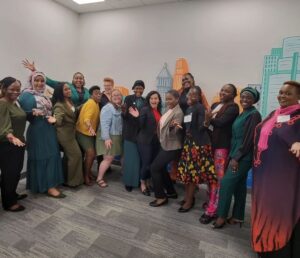
Delegates with the Women Helping Women team
Conclusion
The international Women, Peace, and Security policy framework promotes a gendered perspective and women’s equal and meaningful participation in peace processes, peace-building, and security. Cincinnati and Northern Kentucky have wonderful examples of women creating spaces for leadership. Women’s leadership diversifies thought, creates more inclusive solutions, and increases overall peace and security. Representative Cindy Abrams and the women who run Women Helping Women are prime examples of female leadership in the Southwest Ohio and Northern Kentucky region.


